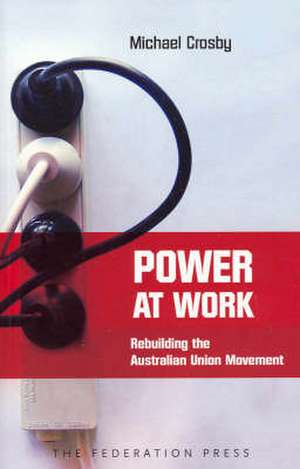Power at Work
Autor Michael H. Crosbyen Limba Engleză Paperback – 8 sep 2005
Preț: 171.63 lei
Preț vechi: 259.25 lei
-34% Nou
Puncte Express: 257
Preț estimativ în valută:
32.84€ • 34.38$ • 27.17£
32.84€ • 34.38$ • 27.17£
Carte indisponibilă temporar
Doresc să fiu notificat când acest titlu va fi disponibil:
Se trimite...
Preluare comenzi: 021 569.72.76
Specificații
ISBN-13: 9781862875692
ISBN-10: 1862875693
Pagini: 320
Ilustrații: illustrations
Dimensiuni: 240 x 154 x 18 mm
Greutate: 0.51 kg
Editura: Federation Press
ISBN-10: 1862875693
Pagini: 320
Ilustrații: illustrations
Dimensiuni: 240 x 154 x 18 mm
Greutate: 0.51 kg
Editura: Federation Press
Cuprins
Contents Introduction Part 1 – Making sense of our situation Australian unions – what is the problem? What the hell happened to us? Why are unions in Australia the way they are? What kind of unions are we? Part 2 - Rethinking Unionism LHMU South Australia Defining unionism that works Organising and leadership Strategic choice Part 3 - Rebuilding organisational capacity Doing the union’s work differently Member service centres Splitting the organiser workforce Organising existing members Organising new members – the role of external or growth organisers The role of the industrial officer Union education National offices Financing change Finding additional resources to win Part 4 - Building strategic leverage Our strategy towards employers Managing the employer relationship The need for scale in organising Doing politics differently The closed shop and the future Part 5 – Driving comprehensive change Leadership Women in leadership Conclusion Bibliography Index
Recenzii
An ambitious and comprehensive programme of change for unions which is at the same time an impassioned call for unions to make some necessary reforms. Crosby’s programme is based on the organising model of unionism to increase the organisational capacity of unions and their social and political leverage. … Power at Work has some undeniable strengths. Firstly, Crosby’s account of union capacity building is fascinating reading, based on evidence collected by the author from his own work with a range of different unions. Michael Crosby’s history as union secretary, union activist and strategist, director of Trade Union Training Australia and the ACT Organising Centre (1995-2005) gives him authority and credibility. Secondly, the tone of the text is captivat ing: Crosby’s voice is impassioned and optimistic, carrying a strong narrative, and conveys his absolute and unstinting admiration for unions and their members, as well as his personal skills as a leader, trainer and activist. Finally, while some of Crosby’s ideas are not beyond criticism, his is an inspired vision with the power to challenge our views and raise debate. Rosaria Burchielli, Journal of Industrial Relations, Vol 48(4), September 2006 This is a timely book. It will be of interest to trade unions for reflection, debate and inspiration to initiate change, to academics for ideas on directions for new research areas, and to anyone interested in trade unions and social change more broadly. Rosaria Burchielli, Management Research News, Vol 29(8), 2006 Whether you agree wtith him or not, what Crosby has to say about the trade union movement in Australia is valid. Unionism in the country has a long and mostly proud history and, as a system, it has played a key role in protecting and improving the wages and working conditions of Australian workers. … This is a timely book that will help explain unionism and its future. It aims to help unions organise and almost reinvent themselves into effective expressions of the collective power of workers. Everyone else would be well advised to take note. Content 8/10 Presentation 8/10 Value 8/10 Human Resources, Issue 93, 15 November 2005 Over the last ten years Michael Crosby has gained a unique insight into Australian unions as a result of his reforming work with the ACTU’s Organising Centre. …His experience, and his passion for change, has informed this book. His account of the strategic imperatives confronting Australian unions in the 21st century is the most comprehensive statement of the issues yet written. Two key dynamics are clouding this future – economic change and a hostile political environment. Michael Crosby makes the case for top to bottom change in unions to address these challenges. His argument is that unions can no longer rely on institutional support from governments, industrial tribunals, awards or ‘passive’ employers. He argues that unions must direct their resources towards building organisational power in the workplace and the industry. This in itself is not a new insight. However, experience has demonstrated that organisational renewal is far easier said than done. The value of Michael’s work lies in his effort to detail what has worked and what hasn’t. Greg Combet, Secretary, Australian Council of Trade Unions This book should be required reading for every trade union official. Michael Crosby’s priority is the empowerment of working men and women. He presents thoughtful and provocative new approaches. Senator John Faulkner Michael Crosby’s analysis is hardhitting, clearsighted and forensic. It amounts to a powerful and constructive tonic for the labour movement at a moment when Australians need effective unions like never before. Dr Barbara Pocock
